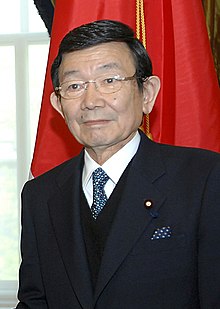Okuma Taro: Difference between revisions
(Created page with "{{Region icon Esvanovia}} {{Infobox officeholder | name = Okuma Taro | image = 240px|Okuma Taro | alt = | caption = Image of Okuma Taro, former Head of the Central Governing Council and former {{wp|Head_of_state|Head of State}} for Neo-Korea in 1989 | office = Head of the CGC | status...") |
No edit summary |
||
| Line 74: | Line 74: | ||
===Foreign Honours=== | ===Foreign Honours=== | ||
[[Category: Neo-Korea]] | |||
Revision as of 03:46, 4 September 2024
Okuma Taro | |
|---|---|
 Image of Okuma Taro, former Head of the Central Governing Council and former Head of State for Neo-Korea in 1989 | |
| Head of the CGC | |
| In office April 24th, 1989 – May 23rd, 1993 (Term of 4 years) | |
| Deputy | Seo Shiro |
| Preceded by | Sera Michio |
| Succeeded by | Muraoka Shig |
| Parliamentary group | Kōshin |
| Member of the Central Governing Council, Sabi District, Third Seat | |
| In office January 1st, 1961 – April 24th, 1989 (Term of 28 years) | |
| Deputy | Seo Shiro |
| Preceded by | Ouchi Ken |
| Succeeded by | Fujimura Hitoshi |
| Personal details | |
| Born | January 14th, 1919 (aged 115 circa 2034) Sabi, Neo-Korea |
| Political party | National Development Party |
| Spouse | Okuma Nobuko |
| Children | Tanin Hideko, Okuma Chiasa |
| Relatives | Okuma Family |
| Residence(s) | Sabi Jūtachi, Sabi, Neo-Korea |
| Alma mater | Sabi School for Foreign Policy |
| Cabinet | First Taro Cabinet Second Taro Cabinet |
Okuma Taro (January 14th, 1919 - Present) was a Neo-Korean politician, bureaucrat, and Head of the Central Governing Council during a portion of the CGC Period, ruling from 1989-1993. Known for his long-running influence in the city of Sabi, reformism, and sudden exit from the position of rulership in the state, Okuma remains a contested figure in the public sphere - adopted and opposed by members of multiple factions during different times. He had two daughters with his wife Okuma Nobuko before her death in 2010.
He would be involved in the 1990 Chamorro Referendum, where a debate was held on the abolishment of the autonomous status of Mizube no Machi, which he opposed both publicly and in backrooms conversation. This was in-line with his noted favoritism towards the Triple Pact allies of the Great War, who he considered to be the closest allies Neo-Korea would be capable of maintaining relations with. He opposed the integration of Jungg'o according to Within The Beomist State, a book written by exile figure (and his daughter) Tanin Hideko.
After being a member of the CGC for two decades, he would be ascended to being the Head of the Central Governing Council following the collapse of the Sera government. He would pursue better relations with a large majority of states - including, controversially, Marquesan. His pursuit of reformism and foreign policy action would lay the groundwork for actions later taken by Beom Dae, although they would not see any particular positivity during the course of his leadership. He is the last living Neo-Korean Head of State to have been born before the collapse of the State of Kaesong, and one of the oldest living human beings alive.
He has been generally reclusive into his later life, commenting rarely on political matters and instead mainly promoting humanitarian causes, such as supporting charity directed towards the Mahdah Lorist Republic.
Early Life
Okuma Taro would be born in the State of Kaesong, shortly before the Chamorro War - which his father would be involved in. His family was generally prosperous, and he was able to complete his education before joining the military shortly after the end of the State of Kaesong. He would fight in the Great War as a member of the forces sent to Pandora after the collapse of Janpia during the war.
After suffering injuries during the Battle of Pandora, he would complete his schooling in the Sabi School for Foreign Policy, studying both Geopolitical Policy and Governmental Philosophy - additionally learning to speak Seurian and Arcadie during this period. After the collapse of the KDS, he would flee to Chamorro - where he worked to organize relief programs and foreign aid to the warring states, eventually returning to the mainland after the majority of such was reunified by Hikaru Sakuma's Atarashī Jōtai.
He would become favorable to Lorist economics during the Great War, seeing the prosperity of the non-involved Azuran state during such. Additionally picked up during this period was support for Meridon and Anagonia, seeing their struggle against Marq as a morally justified and fundamentally ideological matter - and he was reportedly distinctly saddened by the lack of further invasion into Kaskaida.
Member of the CGC
He would become a member of the CGC in 1961, during the first elections hosted in Neo-Korea to determine the makeup of said body. He would be a notable presence within such, shepherding several laws into a position to be accepted by Hikaru Sakuma, alongside acting as a compromise figure between the Seitei-ha and Keieikō factions of the body. He would never be in an official ministerial role, but often was capable of exerting a greater amount of influence than official members of the Cabinet - owing to his capacity to influence their appointment and his control over the National Development Party as a whole.
During this time, he would be member of a number of internal centrist factions - none of which expressed greater amounts of influence than the man himself.